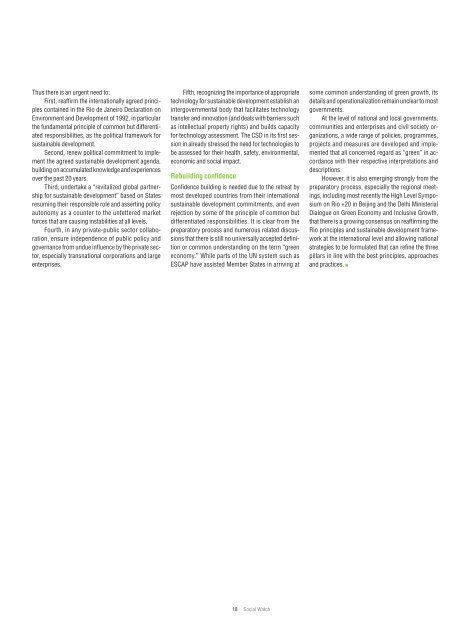burden of deforestation, desertification, erosion of ... - Social Watch
burden of deforestation, desertification, erosion of ... - Social Watch
burden of deforestation, desertification, erosion of ... - Social Watch
Create successful ePaper yourself
Turn your PDF publications into a flip-book with our unique Google optimized e-Paper software.
Thus there is an urgent need to:<br />
First, reaffirm the internationally agreed principles<br />
contained in the Rio de Janeiro Declaration on<br />
Environment and Development <strong>of</strong> 1992, in particular<br />
the fundamental principle <strong>of</strong> common but differentiated<br />
responsibilities, as the political framework for<br />
sustainable development.<br />
Second, renew political commitment to implement<br />
the agreed sustainable development agenda,<br />
building on accumulated knowledge and experiences<br />
over the past 20 years.<br />
Third, undertake a “revitalized global partnership<br />
for sustainable development” based on States<br />
resuming their responsible role and asserting policy<br />
autonomy as a counter to the unfettered market<br />
forces that are causing instabilities at all levels.<br />
Fourth, in any private-public sector collaboration,<br />
ensure independence <strong>of</strong> public policy and<br />
governance from undue influence by the private sector,<br />
especially transnational corporations and large<br />
enterprises.<br />
Fifth, recognizing the importance <strong>of</strong> appropriate<br />
technology for sustainable development establish an<br />
intergovernmental body that facilitates technology<br />
transfer and innovation (and deals with barriers such<br />
as intellectual property rights) and builds capacity<br />
for technology assessment. The CSD in its first session<br />
in already stressed the need for technologies to<br />
be assessed for their health, safety, environmental,<br />
economic and social impact.<br />
Rebuilding confidence<br />
Confidence building is needed due to the retreat by<br />
most developed countries from their international<br />
sustainable development commitments, and even<br />
rejection by some <strong>of</strong> the principle <strong>of</strong> common but<br />
differentiated responsibilities. It is clear from the<br />
preparatory process and numerous related discussions<br />
that there is still no universally accepted definition<br />
or common understanding on the term “green<br />
economy.” While parts <strong>of</strong> the UN system such as<br />
ESCAP have assisted Member States in arriving at<br />
18 <strong>Social</strong> <strong>Watch</strong><br />
some common understanding <strong>of</strong> green growth, its<br />
details and operationalization remain unclear to most<br />
governments.<br />
At the level <strong>of</strong> national and local governments,<br />
communities and enterprises and civil society organizations,<br />
a wide range <strong>of</strong> policies, programmes,<br />
projects and measures are developed and implemented<br />
that all concerned regard as “green” in accordance<br />
with their respective interpretations and<br />
descriptions.<br />
However, it is also emerging strongly from the<br />
preparatory process, especially the regional meetings,<br />
including most recently the High Level Symposium<br />
on Rio +20 in Beijing and the Delhi Ministerial<br />
Dialogue on Green Economy and Inclusive Growth,<br />
that there is a growing consensus on reaffirming the<br />
Rio principles and sustainable development framework<br />
at the international level and allowing national<br />
strategies to be formulated that can refine the three<br />
pillars in line with the best principles, approaches<br />
and practices. n

















